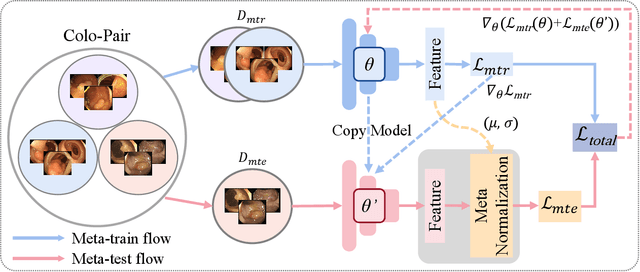Qingzhong Chen
Towards Discriminative Representation with Meta-learning for Colonoscopic Polyp Re-Identification
Aug 02, 2023



Abstract:Colonoscopic Polyp Re-Identification aims to match the same polyp from a large gallery with images from different views taken using different cameras and plays an important role in the prevention and treatment of colorectal cancer in computer-aided diagnosis. However, traditional methods for object ReID directly adopting CNN models trained on the ImageNet dataset usually produce unsatisfactory retrieval performance on colonoscopic datasets due to the large domain gap. Additionally, these methods neglect to explore the potential of self-discrepancy among intra-class relations in the colonoscopic polyp dataset, which remains an open research problem in the medical community. To solve this dilemma, we propose a simple but effective training method named Colo-ReID, which can help our model to learn more general and discriminative knowledge based on the meta-learning strategy in scenarios with fewer samples. Based on this, a dynamic Meta-Learning Regulation mechanism called MLR is introduced to further boost the performance of polyp re-identification. To the best of our knowledge, this is the first attempt to leverage the meta-learning paradigm instead of traditional machine learning to effectively train deep models in the task of colonoscopic polyp re-identification. Empirical results show that our method significantly outperforms current state-of-the-art methods by a clear margin.
Colo-SCRL: Self-Supervised Contrastive Representation Learning for Colonoscopic Video Retrieval
Mar 28, 2023



Abstract:Colonoscopic video retrieval, which is a critical part of polyp treatment, has great clinical significance for the prevention and treatment of colorectal cancer. However, retrieval models trained on action recognition datasets usually produce unsatisfactory retrieval results on colonoscopic datasets due to the large domain gap between them. To seek a solution to this problem, we construct a large-scale colonoscopic dataset named Colo-Pair for medical practice. Based on this dataset, a simple yet effective training method called Colo-SCRL is proposed for more robust representation learning. It aims to refine general knowledge from colonoscopies through masked autoencoder-based reconstruction and momentum contrast to improve retrieval performance. To the best of our knowledge, this is the first attempt to employ the contrastive learning paradigm for medical video retrieval. Empirical results show that our method significantly outperforms current state-of-the-art methods in the colonoscopic video retrieval task.
 Add to Chrome
Add to Chrome Add to Firefox
Add to Firefox Add to Edge
Add to Edge